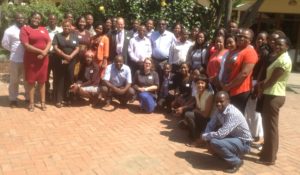Zimbabwe workshop on Access to Global Online Research in Agriculture
The Food and Agriculture Organization of the United Nations (FAO of the UN) in conjunction with several partners has organized a series of training workshops in 2016 across Asia and Africa focused on access to research in agriculture and fisheries. Earlier, workshops were held in Namibia, Myanmar, Tanzania and Ghana. A similar workshop took place in Harare, Zimbabwe 8-9 November 2016.
Tailored to researchers the workshops are aimed at drawing attention to the scope of free online agricultural information available on Access to Global Online Research in Agriculture (AGORA) and AGRIS (International System for Agricultural Science and Technology) and in effectively using these resources. Alongside this core focus, the workshops raise awareness of key trends in scientific publishing in agriculture, fisheries and forestry, with a look at the further range of resources available to researchers in agricultural research, and on Research4Life.
Background
Sub-Saharan Africa, as a whole, is facing several major challenges among them climate change, diminishing land and water resources, post-harvest losses, and population growth that are exacerbating the food insecurity situation of millions of people, especially in rural communities. These require innovative solutions and access to open data could contribute to the solutions.
FAO strongly believes that success in agricultural and rural development depends on individual actions of millions of rural family farmers, whose decisions are shaped by the information, knowledge and technologies available to them. Therefore, easy availability and access to agriculture and rural development related data, knowledge and technologies, contributes to enhancing rural livelihoods and food security.
Open Data – data that anyone can access, use and share, and Open Science – transparency in experimental methodology, observation, and collection of data, coupled with the rapid diffusion of the latest knowledge and broader participation in the discovery of new knowledge play a key role in this context. Open Data is already contributing to agriculture and rural development. It is facilitating information and communication technology based innovations targeting farmers in many countries in Sub-Saharan Africa. It is making it possible to develop applications and services that are helping to keep farmers informed of various issues that affect their work: from pest prevalence and weather predictions to crop growth and market prices.
Workshop: approach
While there are a huge amount of research resources on AGORA and AGRIS, making effective searches on both platforms requires know-how, and the idea is for the workshop to train researchers to get the best out of the two programs so that they can share this knowledge back in their institutions.
The workshops provide an overview of both databases, with guidance on searching through the range of free and low-cost research materials and training on some of the new trends and challenges in open science, open access and open data in agriculture. As well as an overview of intellectual and copyright a further section of the workshop looks at existing tools for accessing information to agricultural research, including Google Scholar, Google Books, Aquatic Commons, PubAg, and TEEAL.
Participant feedback
- Quite an informative workshop which enlightened on issues to do with Intellectual property as well as copyright and Open access as well as Open Science
- overall the workshop was very interesting, informative and discussions stimulating
- The training was a great move, and i was happy to be part of it, I left the workshop an AGORA and AGRIS ambassador!
- The workshop is quite relevant to my work. I can now use the databases confidently and am sure this will help me in my research career and studies. Well organized.
- Excellent workshop. Thoroughly enjoyed every bit.
- Thanks for broadening my knowledge on resource access. The workshop was very useful especially since it can be difficult finding good data in Zimbabwe.
- This was an excellent training which has equipped me with strong skills to use open data for research in my technical field. It is my hope and wish that we have such trainings annually as it is so useful.
- The workshop has been of great help and enlightening especially to encourage use of the Research4Life engine
- The workshop was valuable and enriched my knowledge in research aspects.
- The workshop was very informative and educative and very practical. Good workshop to enhance the capacity of researchers to research information online.
- Workshop was quite refreshing and a few new things were learnt. More awareness should constantly be spread among scientists, researchers and scholars on these platforms of accessing information.
- The workshop was important and has equipped us with skills on how to use open access journal
AGORA, AGRIS, Research4Life
Research4Life is the collective name for the four programmes – HINARI,AGORA, OARE and ARDI – that provides low-income countries with free or low cost access to academic and professional peer-reviewed content online.
The goal of Research4Life is to reduce the knowledge gap between high-income countries and low- and middle-income countries by providing affordable access to critical scientific research.
Set up by the Food and Agriculture Organization (FAO of the UN) together with major publishers (Elsevier has provided over a quarter of the content), AGORA provides low-income countries with access to an outstanding digital library in the fields of food, agriculture, environmental science and related social sciences, with a collection of over 6,000 journals and 5,800 books in over 100 countries.
AGRIS is a FAO-maintained global public database providing bibliographic information on agricultural science and technology. Like AGORA its chief goal is to improve access to and the exchange of agricultural information in low-income countries. Over 150 institutions from 65 countries contribute to the AGRIS network and alongside search results AGRIS links to other sources on the web, further enriching knowledge.
Organizers
FAO organized the workshop in conjunction with GODAN, ITOCA,AIMS, AGORA and Research4Life.






